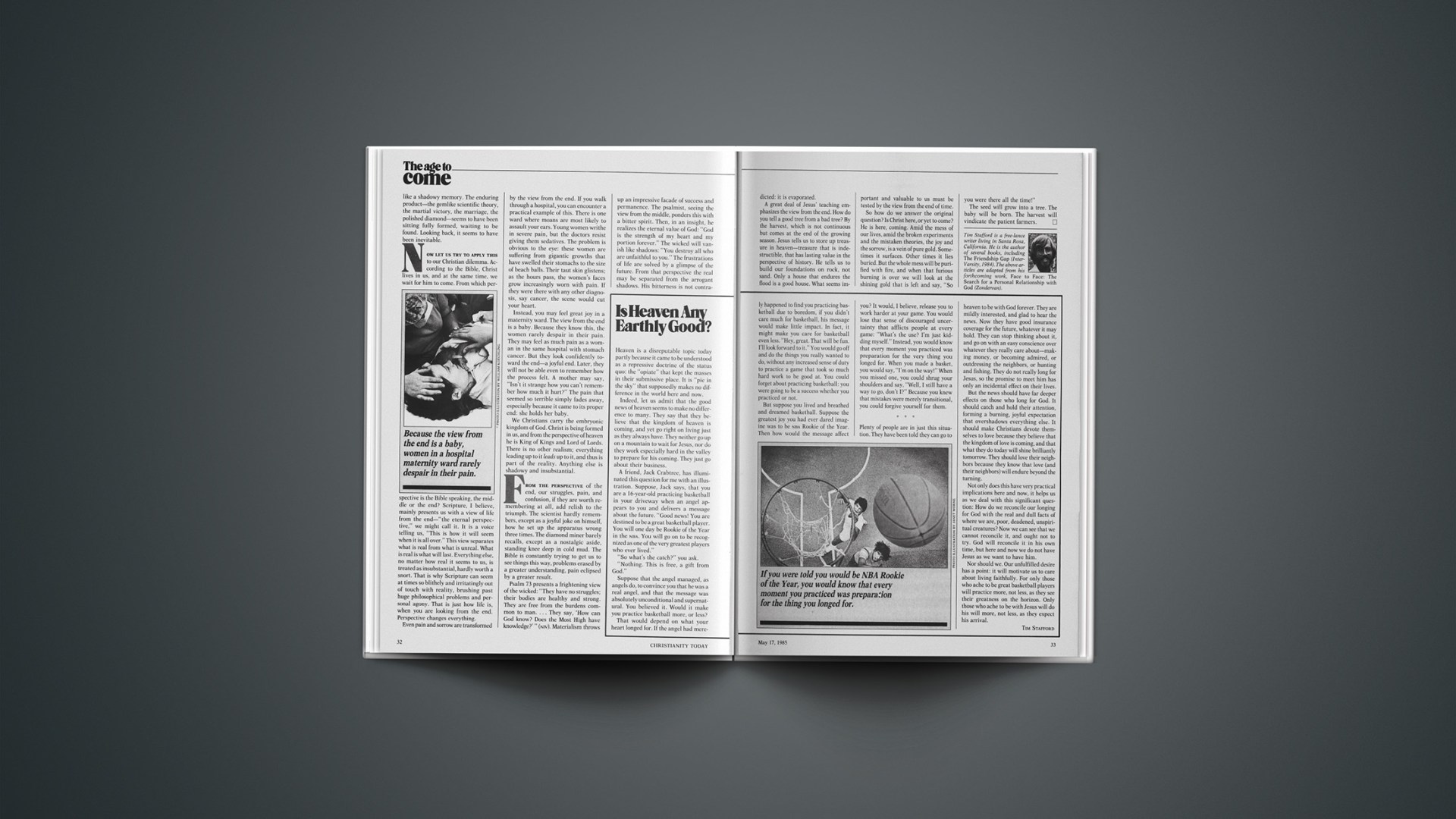Heaven is a disreputable topic today partly because it came to be understood as a repressive doctrine of the status quo: the “opiate” that kept the masses in their submissive place. It is “pie in the sky” that supposedly makes no difference in the world here and now.
Indeed, let us admit that the good news of heaven seems to make no difference to many. They say that they believe that the kingdom of heaven is coming, and yet go right on living just as they always have. They neither go up on a mountain to wait for Jesus, nor do they work especially hard in the valley to prepare for his coming. They just go about their business.
A friend, Jack Crabtree, has illuminated this question for me with an illustration. Suppose, Jack says, that you are a 16-year-old practicing basketball in your driveway when an angel appears to you and delivers a message about the future. “Good news! You are destined to be a great basketball player. You will one day be Rookie of the Year in the NBA. You will go on to be recognized as one of the very greatest players who ever lived.”
“So what’s the catch?” you ask.
“Nothing. This is free, a gift from God.”
Suppose that the angel managed, as angels do, to convince you that he was a real angel, and that the message was absolutely unconditional and supernatural. You believed it. Would it make you practice basketball more, or less?
That would depend on what your heart longed for. If the angel had merely happened to find you practicing basketball due to boredom, if you didn’t care much for basketball, his message would make little impact. In fact, it might make you care for basketball even less. “Hey, great. That will be fun. I’ll look forward to it.” You would go off and do the things you really wanted to do, without any increased sense of duty to practice a game that took so much hard work to be good at. You could forget about practicing basketball: you were going to be a success whether you practiced or not.
But suppose you lived and breathed and dreamed basketball. Suppose the greatest joy you had ever dared imagine was to be NBA Rookie of the Year. Then how would the message affect you? It would, I believe, release you to work harder at your game. You would lose that sense of discouraged uncertainty that afflicts people at every game: “What’s the use? I’m just kidding myself.” Instead, you would know that every moment you practiced was preparation for the very thing you longed for. When you made a basket, you would say, “I’m on the way!” When you missed one, you could shrug your shoulders and say, “Well, I still have a way to go, don’t I?” Because you knew that mistakes were merely transitional, you could forgive yourself for them.
Plenty of people are in just this situation. They have been told they can go to heaven to be with God forever. They are mildly interested, and glad to hear the news. Now they have good insurance coverage for the future, whatever it may hold. They can stop thinking about it, and go on with an easy conscience over whatever they really care about—making money, or becoming admired, or outdressing the neighbors, or hunting and fishing. They do not really long for Jesus, so the promise to meet him has only an incidental effect on their lives.
But the news should have far deeper effects on those who long for God. It should catch and hold their attention, forming a burning, joyful expectation that overshadows everything else. It should make Christians devote themselves to love because they believe that the kingdom of love is coming, and that what they do today will shine brilliantly tomorrow. They should love their neighbors because they know that love (and their neighbors) will endure beyond the turning.
Not only does this have very practical implications here and now, it helps us as we deal with this significant question: How do we reconcile our longing for God with the real and dull facts of where we are, poor, deadened, unspiritual creatures? Now we can see that we cannot reconcile it, and ought not to try. God will reconcile it in his own time, but here and now we do not have Jesus as we want to have him.
Nor should we. Our unfulfilled desire has a point: it will motivate us to care about living faithfully. For only those who ache to be great basketball players will practice more, not less, as they see their greatness on the horizon. Only those who ache to be with Jesus will do his will more, not less, as they expect his arrival.










